80 comments – add your voice!
21847 people reached on Lassi with Lavina – 752 post clicks and 34 likes
Amrita Bhattacharyya, Gulnaaz Lalji and 14 others like it on FB Lassi with Lavina
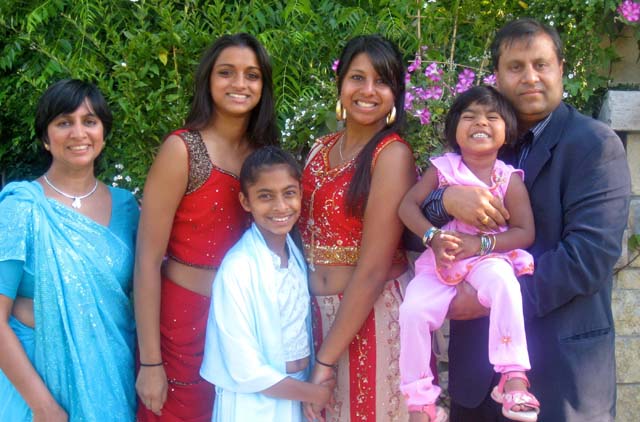
Mothers come in so many shapes and forms – here we pay tribute to adopted mothers and fathers who create families and bring joy to the lives of children who were without families and homes.
Some stories have so much power – and there’s such a need for them! I had done this in-depth story on adoption from India several years ago & I’m amazed readers who are looking to adopt come to it even today for information. So I thought I’d share it again and would love your input and personal experiences with the process of adopting children from India. I do intend to revisit this topic in the coming months and would love your insights.
An Evergreen story
Adoptions from India:
Indian-American Family Stories….
Check out a family photo of Rajiv and Sangeeta Garg and their happy family – four beautiful beaming daughters stand with their proud parents. All dressed for an event in festive Indian clothes, two of the sisters clasp hands while the littlest one grins impishly from her father’s arms. It is a picture not unlike the ones many of us have in our family albums.
So what’s different about this particular image?
When Rajiv and Sangeeta were just in their 20’s and ready to start a family, they idealistically decided they would first adopt a child in need before they conceived one of their own. Today looking at this close-knit family, you’d be hard-pressed to tell who the biological children are and who the adopted ones are. From a crowded orphanage in Mumbai to a loving home in Minneapolis, USA, it’s been a long journey but one taken by this couple with very happy results.
One of the ironies of life is that there are millions of children without homes, without families and there are millions of adults who wish to be parents but cannot. Adoption is the process which can unite them, and yet it is still a loaded word for many Indian families.
For years there was a stigma attached to adoption, especially in Indian society. Adopting a child was reserved for couples who could not conceive a child of their own, often a secret undertaking and managed with a great deal of family resistance, and certainly little support.
In a country like India where so much value is placed on marriage, family values and fertility, it can be particularly difficult for a couple to be ‘barren’ – the word itself conveying emptiness and a joyless-ness. In India it can be feast or famine, where children are concerned. The orphanages are full of abandoned children waiting to be adopted; the streets are full of young runaways and waifs, without supportive parents or adults to turn to.
And on the other side you have thousands of couples, both in India and the Diaspora, who can’t conceive and yearn to have a child to nurture and love. Add to that thousands more who, in spite of having their own biological children, want to adopt children and have the time and resources to do so. So shouldn’t this be the simplest thing in the world – placing abandoned children and prospective parents together to create new loving homes and giving children a future?
Adopting a Baby from India
The US State Department’s Bureau of Consular Affairs statistics shows that between 1999 -2010, 224,615 children were adopted from several countries. The total amount of children from India in this time frame was 4753, and of this the number of girls was 3383 and boys were 1370.
The number of adoptions from India seems to have been dipping over the years: In 1999 the number was 472 – last year in 2010 it was just 241. One would think that this number would be escalating due to the larger Indian-American population and the needs of young couples to adopt.
Most people who have been through the adoption process talk as if they’ve been through the wringer – emotionally and financially – for adopting a child from India is like running a marathon through hoops and mazes.
How can one make sense of the procedures and bring about a quick happy ending? We spoke with several parents who have been through this tough process and asked them to share with us their stories and their tips for doing it better and easier, avoiding the hassles and the potholes in the journey to becoming a new family. Some of these stories are as old as 20 years – and some happened just this year. Each gives us insights into the process of adoption.
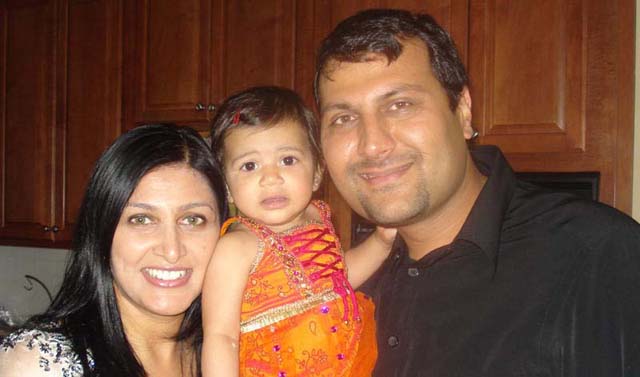
Adoption Story: Rajiv Garg and Sangeeta Jain
Rajiv Garg and Sangeeta Jain, both children of Indian immigrants, grew up in Minneapolis and married at an early age, later settling in San Diego, CA. While Rajiv was working in the computer industry, Sangeeta pursued law and went on to become a district attorney. “Once we started our career paths, we wanted to have a family,” recalls Rajiv. “We had always a vision that we would adopt our first child – so we knew that was the path we would take. Our argument was that if we had our biological child first, the adopted one may not be as loved.”
Sangeeta, who is a judge in family law and child support, runs a nonprofit organization and has always been an advocate for women’s rights and the girl child. Rajiv was fully supportive, having four sisters of his own. They got a lot of resistance from the family who couldn’t understand why they wanted to adopt a child instead of having one of their own, and why they wanted to adopt a girl instead of a boy.
She says, “We were determined and just did it. Any time there are obstacles you have to ignore them to some degree. Adoption is a process in which both parents have to be on the same page – we were both excited to go on this journey together.”
So in their 20’s they stood before the judge in India and adopted their first child. Two years later they had their biological daughter. Six years later they adopted another daughter and then yet another daughter. People just could not understand why they kept adopting but the couple felt that there were enough children, especially girls, who needed a home. To adopt the third child, the entire family along with Sangeeta’s parents went down to India to celebrate the process.
There certainly have been ups and downs. Sonia, the second child they adopted had cerebral palsy, but with therapy she’s fine. The youngest one, Nira, was born with congenital heart disease and two holes in the heart. With medical care in the US, she is well and the holes have healed. All the children were adopted by the Gargs without seeing so much as a photo. As the couple says, “You never get to see your biological children before they are born, so why should you go shopping around for a child in that regard? Whatever is in our fate, we go for that.”
Now 20 years later Rajiv and Sangeeta Garg sum it up: “Today all our four daughters are healthy and well. Our oldest Priya is 20 years old and a beautiful dancer. Nira, the youngest, is five years old and going to kindergarten. The one that is biological – our second one – wishes she was adopted too because she’s the odd one out of the whole bunch! We have a very fun family.”
The Indian community has often had a hard time in accepting adoption as the equivalent of parenthood since it does away with the prerequisite of ‘blood ties’ in order to be a family. “In adoption you really have to believe this child is yours rather than someone else’s,” says Rajiv. “That is key. You both really have to believe in the process, because if you have doubts and lack of confidence, you can go through a lot of emotional turbulence.”
Adoption from India: Apoorva and Shreya Patel
From the Gargs we move to Apoorva and Shreya Patel, who recently adopted an 8 month old baby girl from India. Apoorva graduated from Georgia State University and works in software development, while Shreya graduated from Rutgers University in NJ, and is a cyto-technologist working in diagnostics in Atlanta. .
They were married 10 years before they decided to adopt when they weren’t able to have a child of their own. Nor did they exhaust all the medical options available for, as Apoorva points out, “We were very open to adopting. I had earlier taken a huge pay cut to work in public health in Asia and Africa in the field of global immunizations, and seen so many children who were generally poor or orphaned that it seemed the right thing to do.”
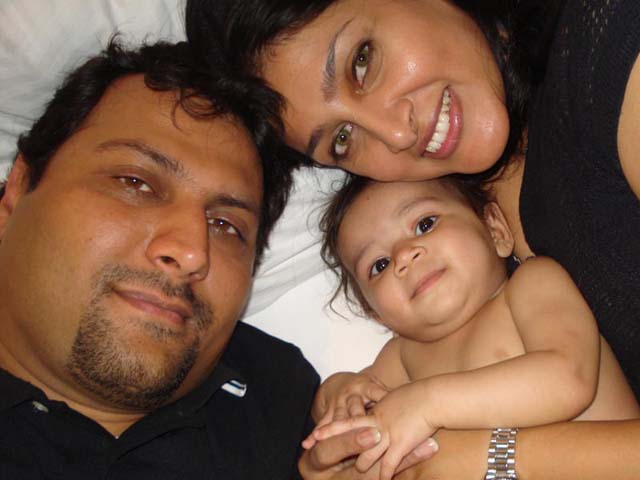
The process which seems simple enough actually took them a good two years. Says Shreya, “It could have been done sooner. We had myriad issues: our agency in US lost some documents, some of our time-sensitive documents expired, the orphanage that we eventually adopted from was in the process of renewing their international license, and finally the civil courts in India had a month long recess.”
Indeed, mentally and financially adoption is a grueling process and the paperwork is not easy. Shreya remembers crying once in a while and feeling very frustrated. She understood the reasons for the procedures and that the background checks were for the safeguarding of the children but feels the process could have been speeded up. For instance, instead of all the judges taking a recess at the same time, their timing could be staggered so that business could proceed as usual.
On Mother’s Day, she finally got the news that they had got the NOC, which meant they were almost home with the baby. She got the call at work and broke into tears and her colleagues rejoiced with her on finally becoming a parent. She recalls, “It was a perfect Mother’s Day gift.”
They went out with friends to celebrate but having waited so long, Apoorva was stoic: “Until we had the baby in the US I was celebrating very cautiously because I knew anything could go wrong between now and then.” It took another three months to get the adoption deed, which is the court paperwork, before they could actually bring the baby home to the US.
Adoption Do’s and Don’ts
Having been through the process themselves and now back home with their beautiful 19-month-old Sanaya, the Patels are helping several other parents who want to adopt. “It can be an emotionally draining experience but absolutely worth it,” says Apoorva. “ So, people should be prepared to wait and spend a lot of emotional energy. There are times where you have done everything you can and then you just wait – it can be extremely frustrating.”
To make things go smoother, he suggests keeping copies of all documents in case the agency, courier or orphanages lose them. It is also a good idea to study the adoption rules thoroughly – for instance, they learned that a child in an Indian orphanage had to be rejected by three native Indian couples before he could be put up for an international adoption. There are also rules that you cannot communicate directly with an Indian orphanage but have to go through an agency in the country where you live.
The Patels saw interesting reactions to adoption in India and the US. Friends in India would be almost commiserating instead of congratulating when they learned the couple was adopting. They would console: “It’s OK, it’s OK.” Others were puzzled as to why they were adopting a girl instead of a boy when they had the ability to choose.
In the US, the attitude was very different. Says Shreya: “It’s all been so positive. All our family has been great – very warm and welcoming – my parents absolutely love Sanaya – they were just so happy we were able to get a child. A friend of mine who was visiting India during the adoption process actually visited the orphanage to meet the baby, and here my friends constantly drop in to see Sanaya.”
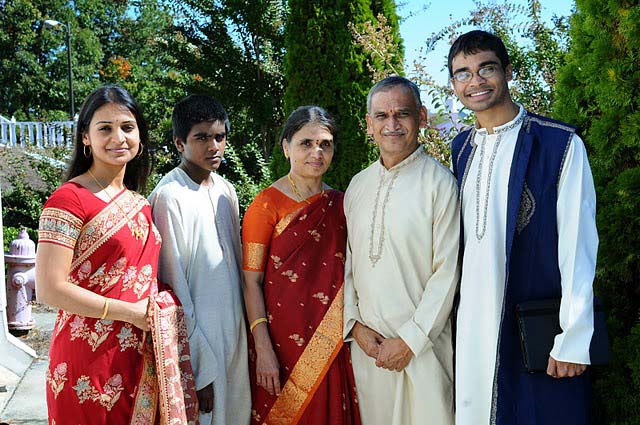
Adoption Story: Ravi and Seshu Sarma
While the Gargs and the Patels adopted children under the age of one, Dr. Ravi and Dr. Seshu Sarma went in for a bigger challenge – adopting an older child. The majority of the Indian children adopted by US couples happen to be under the age of 2 but the Sarmas decided to adopt a four-year-old after their own biological children became teenagers.
“It was something I’d always wanted to do since I was young,” says Seshu, who got married at the age of 20 as a 4th year medical student. She is now an associate professor in Atlanta and both she and her husband Ravi, who is an oncologist, got their training in the US. They have been in Atlanta, GA for 31 years and are very active in the Indian community.
“ We had our children in our 20’s so by the time we were 40 they were grown and we were still young, had energy and resources so we started thinking of giving someone a home who didn’t have one,” she recalls. “Westerners tend to adopt girls and Indians tend to adopt boys but as babies. So older boys get left out because they don’t get adopted easily.”
In spite of their good intentions they almost didn’t get a child to adopt because the judge in his wisdom ruled they already had a boy and girl of their own, and adoptions were to be made only to childless couples. However, an American family at that time had applied for a girl child and already had two biological daughters of their own. When the judge vetoed the adoption, they sued in the Indian Supreme Court – and won.
So now that a precedent had been set, the orphanage agreed to the adoption by the Sarmas – and they brought home 4-year-old Sriram, who spoke Telegu like them and is from Andhra Pradesh. This year he will turn sixteen, a typical American teenager, handy with gadgets, but indifferent to success. This makes it harder on the Sarmas whose older children are high achievers. She says, “The older ones love him to death, and they go out of their way to help him. Our youngest is extremely bright but his intelligence cannot be measured by tests. He’s a very good kid but strong willed – a typical teenager.”
What advice would she give to those thinking of adoption? “If their heart is in it, they should do it because I have seen several couples who have struggled with adoption – it’s not easy, especially with older children,” she says. She points out that these children grow up in an orphanage with 50 other kids and the whole concept of a family unit is initially hard for them to understand. She adds: “Children can become detached when people don’t hug them, sing to them and tell them stories – all the things we do with our kids. In an orphanage a child is just one of fifty.”
For the adopted child there are always so many questions. Seshu recalls her youngest son asking her and Ravi, “I need to ask you something. I know I’m adopted but do I get your genes?”
She told him, “A mother is a mother because she raises a child, not because she gives birth. You sound so much like us, you have our mannerisms – you are what you are because you’ve been raised by us and reflect our upbringing.” Sriram, she says, is an extremely smart boy but his answer was, “Oh shucks – I was hoping I’d get your genes!”
How do Parents Tell their Children they are Adopted?
And that brings us to the 800 lb gorilla in the room – how do parents tell their children they are adopted? For Shreya and Apoorva, the dilemma was simplified by the online parenting classes they were required to take when they registered with the local agency in Atlanta. These taught them to tell the child as soon as she could understand, before others tell her, and to celebrate not only her birthday but also the ‘Gotcha’ date. Says Shreya, “I’ve made her a scrapbook and she loves looking at it, at the religious ceremony her grandmother did to welcome her into the house.”
Rajiv Garg goes one step further: he actually writes his newly-adopted daughters a letter right on the plane as the family flies back from India – and these letters are there for them to savor as they grow up. The older sisters also flew with the family to India when the youngest girl was adopted and so the whole process is a natural one for them. The girls get two celebrations instead of just one – birthdays and the adoption anniversary.
“You have to know and tell them of their past and all of them react differently,” says Sangeeta. “The older one couldn’t care less, the second one has a strong feeling about it and questions, and it’s a good healthy dialogue. It’s part of their life and heritage and something we are very proud of. We have an album – it creates a much trusted environment.”
Adoption, like life in general, has highs and lows but these couples swear by the unmatched happiness it brings. ‘Family’ is probably one of the most beautiful words in the world – yet what makes a family a real family? It is bonds of love nurtured over the years, something much more intangible, more intricate than mere blood ties.
“All families have their challenges and we are no different,” says Rajiv. “It’s been a wonderful journey and I would encourage everyone to experience this because it’s very rewarding to see what one can do.” Often, the experience opens up new avenues and ways of thinking. Rajiv and Sangeeta Garg now run the Creative Kids Academy, a day care and camp facility to prepare children for schooling.
Changing Attitudes Toward Adoption
Over the years the attitude of many in the Indian community has changed toward adoption. For younger people it is not even an issue. In chat rooms and forums, couples talk about adopting in spite of having their own children, and single women are open to adopting on their own. Then there is the whole spectrum of gay couples – all longing to adopt children and start a family. As the definition of ‘family’ changes, we will see many new scenarios.
Many years ago, Rajiv recalls, his parents had initially a traditional perspective on the issue of adoption, emphasizing the importance of having your own biological children to continue the family line. They were hesitant about the planned adoption, fearing what people would say, but it helped to sit them down and have a dialogue. He says, “Lots of families don’t talk, they get pressurized into society’s comments rather than following their hearts and beliefs. We’ve always felt do what’s right and don’t let society be your controller.”
The bonds grow over the years, especially with the grandparents. In some cases, there is so much blending that family members start looking like one another. The Gargs are often told that their oldest looks like the grandmother, while the youngest looks like the grandfather!
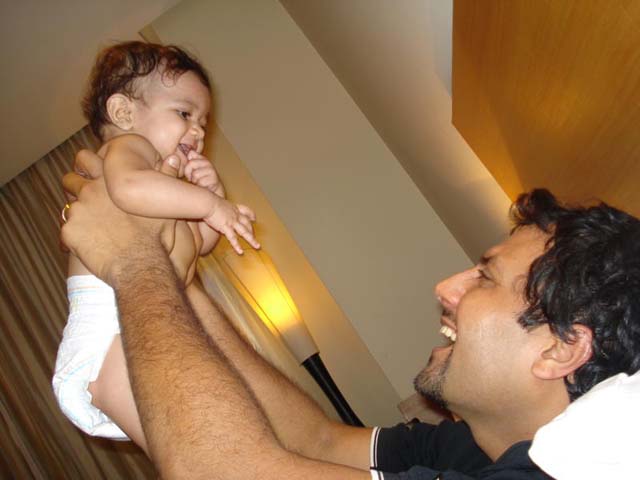
For Apoorva and Shreya, adoption has been absolutely worth the wait and the heartache. “It can be emotionally draining but the outcome is awesome. Once you have a child you forget about all the frustration you went though just to get that child,” says Shreya.
What’s the best part of the whole experience? “For me it’s the random hug that she gives us just out of nowhere,” she says. “She’ll just come up and kiss you on the leg or the cheek, or come and give you a hug for no reason whatsoever.”
For Apoorva, the joy is in every moment of having their baby daughter with them, even when Sanaya cries, in changing her diaper or even when she throws up. “It’s the whole experience,” he says. “It’s been nine months and I still have to pinch myself that she’s in our lives.”
As for society talking or disapproving of their family or narrow-minded relatives not being comfortable, he laughs: “My mind tells me I don’t really have to worry about what other people think. They can tell me how to live my life only when they start paying my mortgage!”
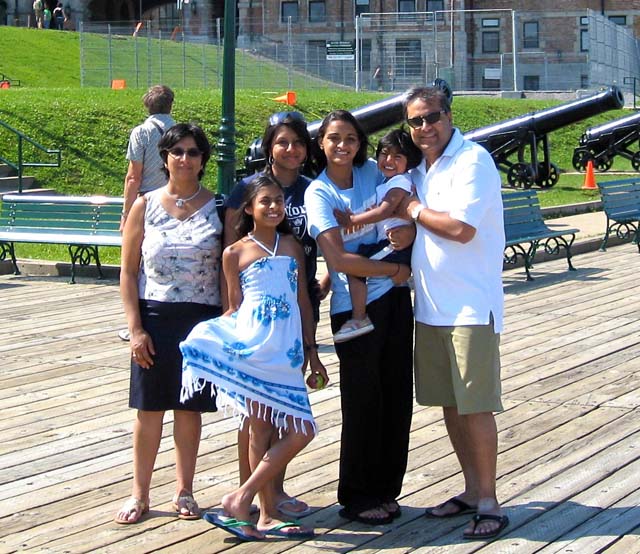
Adoption from India: A Child’s View
Not all adoption stories turn out happily and others reach the happy ending only after a lot of turmoil and angst on the part of the adopted children. There are children like Tina (name changed) who agonized about her birth mother, going to great lengths to search for her, experimenting with drugs and rebelling – and testing her adoptive parents at every junction. They responded with unconditional love every step of the way, and that turned out to be the magic mantra. As she grew older, Tina became secure in herself and her family, and stopped searching, content in the love all around her.
Then you have Shalu (name changed) who was adopted at the age of 7 and really put her adopted family through hell, as she tried to find her identity. As a teenager she became an alcoholic and had to drop out of school. Her parents stood by her, sending her to Alcoholics Anonymous, and now as a young adult, she is finally fine and adjusted to her family.
Indeed, stories vary from child to child and family to family. Here Priyanka, daughter of Rajiv Garg and Sangeeta Jain shares her view of adoption.
Adoptions from India: Priyanka’s Story
My name is Priyanka Garg Jain and I am now 20 years old. My dad Rajiv Garg and my mom Sangeeta Jain adopted me from Bombay when I was 7 months old. Of course I don’t remember January 27th 1992, the day when my parents adopted me. However, I along with my 3 younger sisters celebrate this precious day each year with great pride. My mom always gets teary-eyed reminiscing about it. Together we page through my adoption album, which contains pictures, letters, adoption papers and many memories.
I have never felt the need to find my birth parents nor the desire to search for my roots somewhere in Bombay. My parents took me to the neighborhood where my foster home was when I was 9 years old. Not for once did I reflect back on my past life. My heart and soul are warmly content, knowing I am loved by the only family I have ever known.
On the other hand, my younger sister Sonya, who is thirteen, struggles each year on her adoption anniversary with the thought of not knowing anything about her birth identity. She gets quite emotional wondering where her birth parents are. I hold her and comfort her telling her how happy I am and that we all love her. I guess I consider myself very lucky that I am not consumed nor haunted by the same thoughts that come to Sonya’s mind.
The reason I feel so connected to my family is because we all look alike. My facial features resemble that of my Nani, my maternal grandmother. I adore my grand parents because they have truly given me unconditional love that only grandparents can give. People who meet me and my sister Sonali for the first time, often ask if we are twins. When asked if we are twins, I simply smile and reply, “No, I am older and smarter”. All of us have been brought up alike with me leading the way. Since the age of five, our parents have taken all of us for lessons in skating, karate, art, swimming, tennis, golf, sailing, and Kathak dance. My sisters look up to me, which makes me realize and appreciate the loving family I have.
In conclusion, it doesn’t matter if you are adopted or biological, you have to have the sense that you are accepted, loved and you belong in a family. I could not ask for anything more since I have everything that I could possibly want.”
(C) Lavina Melwani
This story first appeared in Khabar magazine
Bringing Baby Home
Tips for Adoptive Parents.
The Process
Because India is party to the Hague Adoption Convention, adoptions from India must follow a specific process designed to meet the Convention’s requirements. This process will follow six primary steps. You must complete these steps in the following order so that your adoption meets all necessary legal requirements.
- Choose an Adoption Service Provider
- Apply to be Found Eligible to Adopt
- Be Matched with a Child
- Apply for the child to be found Eligible for Adoption
- Adopt the Child (or Gain Legal Custody) in India
- Bring Your Child Home
India‘s Adoption Authority
Central Adoption Resource Agency (CARA) http://cara.nic.in/
Everything You wanted to Know About Adoption – But were Afraid to Ask
Adoption from A to Z from the state department: http://adoption.state.gov/content/pdf/Intercountry_Adoption_From_A_Z.pdf
A Tip for Travelers
Stay in touch when you head overseas…
If traveling abroad during the adoption process, we encourage you to register your trip with the Department of State. Travel registration makes it possible to contact you if necessary. Whether there’s a family emergency in the United States, or a crisis in the country you’re visiting, registration assists the U.S. Embassy or Consulate in reaching you.
Registration is free and can be done online
Useful Sites for Adoptive Parents
■ U.S. Department of State, Office of Children’s Issues: Intercountry Adoption
homepage http://Adoption.State.Gov
■ U.S. Citizenship and Immigration Services homepage http://www.uscis.gov
■ Child Welfare Information Gateway http://www.childwelfare.gov
■ Hague Conference on Private International Law
http://www.hcch.net/index_en.php?act=conventions.text&cid=69
Other links which may provide information of interest to Prospective
Adoptive Parents include:
■ Adoptive Families Magazine www.adoptivefamilies.com
■ Adoptive Parents Committee http://adoptiveparents.org
■ Center for Adoption Support and Education (CASE) www.adoptionsupport.org
■ Center for Parent Education and Family Support www.cpe.unt.edu
■ Families Adopting in Response (FAIR) www.fairfamilies.org
■ International Adoption Center www.adoptionclinic.org
■ The Joint Council on International Children’s Services (JCICS) www.jcics.org
■ National Council For Adoption (NCFA) www.adoptioncouncil.org
■ North American Council on Adoptable Children (NACAC) www.nacac.org
Other Helpful Links:
■ The American Academy of Adoption Attorneys (AAAA)
www.adoptionattorneys.org
■ The Evan B. Donaldson Adoption Institute www.adoptioninstitute.org
Related Posts:
Everything You Wanted to Know About Surrogacy but were Afraid to Ask
When Couples Adopt from India – meet an Indian-American Family

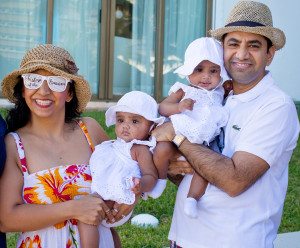
80 Comments
Such a useful content. Now I know the entire process of adoption. Thanks a lot.
Mona, sorry I missed responding – I will email you the contacts too.
Hi Shobha,
I know you’re anxious so apologies for the delay! I have emailed you the contacts today. Good luck!
Hi Lavina, could you please let me know the emails or contact numbers of the couples that adopted girls., thanks Shobha
Hi Shobha, wish you both lots of luck – and happiness in parenthood. I will email you the names of the couples I interviewed for this story and they may be able to guide you on your next moves.
Hi Lavina, I am an Indian passport holder married to a wonderful husband, who is an American. I am looking into adopting an Indian girl child. I would like to go through this process as an Indian. Could you please hook me up with one or two Indian parents. Thanks for your article and it came up couple of times I tried googling. I am glad that I read your article. Thanks in advance. Shobha
Hi Lavina,
Great article. Is there any way I could get email of some of these couples as I am in the process of starting this process and I am looking to get some references for the adoption agencies they used in India etc.
Appreciate any help possible. Thanks!
M. D. G
Some friends went to Delhi last year, and apparently were told that India’s adoption laws had recently changed. And that foreigners, including those of Indian origin, were not prioritized as adoptive parents. So that adopting from India is now near-impossible.
Can you corroborate this?
Nice article. Thank you for writing it. My wife and I are working on adopting a sibling group of 3 sisters from India. We are a non Indian inter-racial American couple.
The process does take a long time and we are emotionally drained, but we try to patiently wait. We have done all we can do at this point. We have been at this since 2012. It is now 2015.
Babu, delighted to hear from you and so glad to know you enjoyed this article. Thank you!
Always enjoy reading your blogs! Great article! Keep it coming – thanks!
Hi Amar,
I will connect you via email with Apoorva and Shreya Patel – good luck with the adoption process.
Hi Lavina – we are in the process of adopting from India and have run into some hiccups. I was hoping you could put me in touch with one of the families listed on your page, e.g. Apoorva and Shreya Patel. Let me know if you can help.
Thank you Lavina..
Savitha – I have introduced you by email to Apoorva and Shreya
Thank you so much Lavina. Yes after reading the articles I figured it would not be easy. I still want to look into it. Appreciate all your efforts.
Savitha, I wish you all the success in adding to your family. What I understand from the experiences of those I interviewed, it’s not an easy task to adopt. I can certainly put you in touch with some of these couples and they might be able to guide you.
Thank you for this heartwarming article. I have been weeping the whole time reading it and imagining that I have gone through all the procedures and getting my 2nd baby home. My husband and I have been married for 11 years and we have a 7-yr-old handsome boy. Please help us adopt our second child. Back home we are from Pune.
Thank you so much!!
Mia, I will put you in touch with the families via email. Good luck and wish you a happy family.
Hey Lavanya – I came across your website while searching on Google. We are planning to adopt so can you help us get in touch with some of these families?
Thank you so much!!!
i want to give my daughter for adoption. I belong to middle-class family in India but I want to give my daughter to Indian-American only so the future can be bright for my daughter.
Sirisha, I have put you in touch with Apoorva and Shreya Patel by email. Hope you get some useful information which may help your sister get started on the adoption process. Wish you the best with this!
Lavina,
Awesome! Thank You so much! That will be great. My sister lives in Chennai and my parents in Hyderabad. So either of these cities or Pune/Bombay will work too. Thanks for the help. Appreciate it.
Sirisha, glad to know your wanderings through Google brought you to Lassi with Lavina! Welcome – and do hope you’ll visit often, as I do try to give new material almost every day.
Re: adoption. I can put you in touch with the people I interviewed in this story, especially Sangeeta Jain and Rajeev Garg as they’ve gone through the process of adopting in India thrice. I will also ask around and if I find some reliable contacts in India who have adopted, I will email you. Let me know which city your sister would prefer.
Best – Lavina
Lavina,
I came across your website through Google when searching for experiences of adoption in India. Thanks for putting across such a wonderful article. It gives a lot of hope and encouragement to those in the pathways to adoption. My sister who lives in India has had unsuccessful attempts at pregnancy and the couple are now considering adoption as one alternative.
However, we really wish we could talk to someone real who went this path before to know some practical viewpoints in the process. Do you know any cases of Indian couples living in India who have adopted. If so, will you be able to connect us to them. We owe you a big one! Thanks in advance for your help. Once again, a nice job! I am glad I stumbled across your website!
Shanta, where do you live? With the article I have given several resources in the US and India. Hope that will help. Also, talking with families who have adopted from India is always a help, as they can give you tips and also tell you about difficulties ahead of adopting.
I’m looking to adopt a little girl from India. Any advice?
Mani, so glad you enjoyed the article and it was useful to you. I wish you lots of luck in adopting a child and a speedy outcome! I am emailing you the contact for Apoorva and Shreya Patel – they have been very helpful in sharing their experiences with other couples who are looking to adopt from India.
Hi Lavina,
We came across your beautiful and touching article on ‘Adoptions from India – Everything You Wanted to Know’ and look forward to reading more from you.
We loved this even more as we are in the process of adopting a child from India and would love to get some assistance/help from the Patels as they had gone through the process recently. I would really appreciate it if you could send contact information for Apoorva and Shreya Patel.
Thank you so much!!
Mani
Hi Lavina –
I want to THANK YOU so much for your wonderful website! The reason why I love
your website is that your articles have increased the visibility of South Asian
individuals and organizations that are not in our so called mainstream (ie
high paying bankers and doctors, and the usual Masala and Bollywood
events). I also like the fact that you are drawing light to issues that are not
openly addressed (the Rajaratnam scandal, Indians who are adopting).
Keep it up!
Laavanya
I don’t know how to break the bad news, but being adopted into one’s own ethnicity is no guarantee of a “successful” adoption, whatever that means. Friends of mine adopted into Lebanese-American families still go through feelings of loss, abandonment, grief, and the longing to have a sense of their identity.
Personally, I was adopted through a Catholic orphanage, but am likely from the Muslim south of Lebanon. I’ve returned to my birth country, and am attempting to re-establish the links that were ruptured by my trafficking and adoption. My heart aches for these parents, who have been “Anglo-fied” into the concept of the nuclear family, individualism, and American privilege. For lying behind all of the “happy” stories is the bigger picture of the disparity between rich and poor, and the ability of the rich to take from the poor with impunity.
This is the story that needs be told, and I would hope that those hoping to adopt today would turn to the stories of those of us from South Korea, Lebanon, Ethiopia, Eritrea, and other places where this has been going on for far too long in order to get the other side of the story.
Dimple, this was a very small thing – but glad to be a cog in the whole machinery of positive things happening!
Pingback: India, US: Stories Of Adoption From India
Pingback: India, US: Stories Of Adoption From India | Current Affairs
Pingback: India, US: Stories Of Adoption From India · Global Voices
HUGE HUGE HUGE…thanks to you…sorry it has taken me some time to leave a message..I have a 6-months-old who keeps me pretty busy…lol…but I just wanted to express my heartfelt thanks to you for helping me get in touch with Shreya…I will always remember this act of kindness and how your hand has touched this whole process..thank you again..you are the best!
Certainly, Mr. Matthew – why reinvent the wheel? I’m sure Apoorva and Shreya Patel will be able to guide you. I will connect you via e-mail and wish you the best.
Ms. Melwani,
I read your article with great interest on “Motions and Emotions Surrounding Adoptions” in the Khabar magazine which is published in Atlanta area.
My son and daughter-in-law want to adopt a child, preferably from India. My wife and I are of Indian origin settled in the US. I would really like to get in touch with Apoorva and Shreya Patel since they have recently adopted a child from India. I am sure they could give us very valuable information to speed up the process. Would you please be kind enough to pass on my email address to this couple or send me their email address? Thanks in advance.
Nita, thank you for your comments! You know, the fact that the article inspired you to try and adopt is the biggest compliment to my work. Be advised though that adoption is not easy but I’m sure the rewards make it all worthwhile.
Wonderful article, Lavina. My name is Nita and I live in Dubai. Your article is very inspiring..and encourages me for adoption. Thank you!
Hello Dimple – glad you found this story in Khabar, for which I had written it originally. In fact the contact of that couple was provided to me by the editor. Apoorva and Shreya Patel are a wonderful couple and have helped many others in their quest for adopting a child. I will send you their email contact. Wish you the best!
Stacey, thank you for your comment. I am curious – what are the procedures for adopting children of leprosy patients? Is there still a stigma attached to this and how easily do they find a home?
Hey Lavina.. this is Dimple Patel and I read this story first in Khabar magazine…and it couldn’t have come at a better time..we are about to apply for adoption and could really use firsthand help..we are located in Atlanta and wanted to get in touch with the couple from here..I wrote to the mag but they didn’t respond to me. Any help you can provide will be VERY helpful…maybe you can contact them and see if they want to help us out..thank you.
Wonderful article Lavina; so informative and heartfelt. Having lived and taught in Udayan School for the rehabilitation and welfare of children of leprosy patients, I have often been asked about the possibility of adopting these children. I thank you for providing some answers and pathways to do just that. Not only will this be a blessing for the child, but a blessing for the adoptive parents as well. God bless.
Tika, there are hundreds of stories out there and we took just three unique tales from people who were willing to share their experiences. There are many examples and anecdotes of infertility and assisted conception but that would be a whole different story for another time.
Interesting article, but everyone’s stories sounded oddly happy. Would have liked the article to have delved into the source of many couple’s need to adopt: infertility issues, and the heartache of having gone through various forms of assisted conception before coming to the choice to adopt.
Also, as your audience includes people from Canada and other countries, it would be great to include adoption resources for Canada etc. Thanks.
Michelle, thank you for your comment. You do such wonderful work – I hope you will share your story with readers too.
Leena, thank you. I found all these stories inspirational – imagine remaking lives. It seems to be a powerful way of making a difference in the world.
Lavina, you have done a wonderful and sensitive reporting on adoption in the Indian community. I hope it will inspire more families to consider adoption, including children with special needs. Great story. Thank you. Michelle
Once again, Lavina, a brilliant article. It is so refreshing to read about Indian American families that have open minds and open hearts – especially to raising a child that is not their own biologically. Biology does not create families, LOVE does!